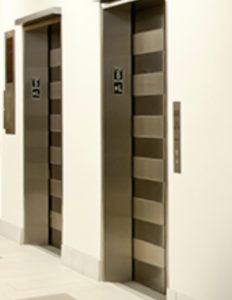With hundreds of thousands of elevators throughout the United States, many people use them every single day. Elevators are a quick and convenient form of transportation within a building. However, Chicago elevator accident lawyers know that with such frequent use comes the potential for accidents and injuries.
We take elevators for granted, but malfunctions can happen any time you step into an elevator.
When elevator equipment is not properly maintained or operated safely, serious accidents can occur. If you sustain serious injuries in an elevator accident, you may recover monetary compensation for your injuries.
Common Causes of Elevator Accidents
People get injured while riding elevators more often than you might think. According to the Centers for Disease Control and Prevention (CDC), elevator and escalator incidents cause approximately 30 deaths and 17,000 injuries each year across the United States.
Elevator accidents occur when elevators are not properly maintained, or their parts and components are defective.
In either case, one or more of the following can occur:
- Improper leveling: Elevators require alignment to ensure they stop at the same level as the floor. When leveling is not aligned, the elevator stops higher or lower than the floor resulting in passengers tripping and falling.
- Elevator drops: A mechanical failure will result in the elevator falling abruptly. The sudden jolt of motion will cause the passengers inside to jerk about, hitting each other and the elevator. When the elevator stops at the bottom, it can cause further injury.
- Falling accidents: Entering and exiting the elevator can be dangerous for some passengers. There is the possibility that you can suffer a fall, especially when there are inadequate warning labels.
- Falls into the elevator shaft: The scariest accident for elevator victims is falling into the elevator shaft. Passengers can fall into the shaft, with deadly results depending on how far the elevator is from the opening. These accidents are avoidable because the elevator doors should always stay closed unless passengers enter or exit. A mechanical failure can cause the doors to open when the elevator is stuck.
- Lack of retraction: Elevator doors have features to ensure no one becomes trapped. The process involves the doors retracting upon contact. When there is a lack of retraction, the elevator doors will close too quickly, trapping a person’s limb or clothing. Another cause is improperly functioning safety features.
- Faulty wiring: There are many wires and electric components of an elevator. When one of the wires is defective, it can cause someone to suffer an electrocution injury when they press one of the buttons.
- Sudden stops: Similar to an elevator drop, a sudden stop can cause the passengers to fall and move about the elevator abruptly. A sudden stop happens when the elevator comes to an abrupt halt.
- Entrapment: When an elevator malfunctions with passengers in the car, they can suffer entrapment injuries. When there are so many people in one elevator car, they can become claustrophobic. There is little oxygen flow in the cars and no place to use the restroom or get water. Parties with pre-existing conditions can experience a flare-up or become afflicted by more pain because they cannot access care or the situation within the elevator is dire.
- Emergency communication failure: Elevators have emergency communication systems that passengers can access when an issue arises. When these systems do not work, passengers cannot alert emergency personnel. While you may have cell phones, they are notorious for not working inside elevators. It can take hours to inform emergency services and get the elevator sturdy enough to get passengers to safety.
Millions of Americans use elevators every day without thinking that they may injure them. While elevator accidents are rare, it does not mean that you will never be injured while using an elevator in your lifetime. Unfortunately, many elevators across the country are not properly maintained, serviced, and installed, which creates a risk of accidents.
Common Types of Injuries in Elevator Accidents
Depending on the circumstances of the elevator accident, injuries suffered by passengers can range from minor to severe.
While the type and severity of injury depend on what caused the accident, some of the most common types of injuries associated with these accidents include:
- Head trauma, including traumatic brain injuries (TBIs)
- Spinal cord trauma
- Paralysis
- Back and neck injuries like herniations
- Broken bones
- Torn ligaments
- Dehydration
- Loss of a limb
- Crush injuries
Regardless of the type of your injury, it is vital to seek immediate medical attention to document the injury and begin the treatment as soon as possible. It is also important to notify the building owner or manager of the accident. Then, consider contacting a Chicago elevator accident lawyer to discuss your legal options.
Who Is Responsible for Elevator Accidents?
Among the first and most crucial steps is determining the responsible party and naming them as the defendant in your claim. Many elevator victims believe that only one party is liable for their injuries when the reality is more complex.
There are three defendants we see most often in these cases:
- Building owner: No matter what building you are in, the owner must maintain the facility free of dangerous conditions and hazards. If there are hazardous conditions, the building owner must warn all visitors and make arrangements to block off the threat until the appropriate party can resolve it. When there is a problem with an elevator, the property owner must place it out of order and have the proper maintenance performed.
- Maintenance technician: Elevators require periodic service by a third-party company. If the service provider did not properly maintain the elevator or did not address a hazardous issue, they can be the liable party in your claim.
- Elevator manufacturer: All products will have various parts, and an elevator is no different. There are several ways a product is defective from the design, marketing, or production. Elevators must have safety markers and instructions. They will also need to have all the correct parts in working order. If the manufacturer fails in any of these regards, they will be liable for your injuries and damages.
The culprit for your accident will not be immediately apparent. Still, a Chicago elevator accident lawyer can investigate further and find the negligent party responsible for your losses.
How to Prove an Elevator Accident Premises Liability Case?
To prove negligence in an elevator premises liability case, the accident victim must show that the building owner, elevator manufacturer, elevator installer, or maintenance company owed a duty of care.
The accident victim must also show that one or more of these individuals or entities violated the applicable duty of care. Lastly, the elevator accident victim must show that this violation directly resulted in all of the injuries and damages about which he or she complains.
Thus, a successful elevator accident premises liability case involves four criteria:
- Duty of care. The liable party (often the building owner or elevator manufacturer) was responsible for manufacturing/operating the elevator in a safe manner.
- Breach. The liable party breached the duty of care due to negligence.
- Causation. The liable party’s negligence was responsible for the accident, causing the victim’s injury.
- Damages. The victim suffered damages as a result of the liable party’s breach of duty.
In some cases, an elevator accident attorney in Chicago may argue the doctrine of res ipsa loquitur. This means the accident would not take place without negligence.
To show a res ipsa case, the plaintiff must demonstrate:
- The accident would not occur in the absence of negligence
- The elevator is under the control or management of the defendant
- There is no indication the accident was due to any actions of the plaintiff
The accident victim must also suffer harm that is directly attributable to the property owner’s negligence. A Chicago premises liability attorney can help you prove liability and damages in your elevator accident case.
The Challenges of Handling an Elevator Accident Case
Being involved in an elevator accident can be a scary and stressful experience. Even though the worst is behind you, you may still encounter many challenges when handling your legal claim and fighting for the compensation you deserve.
On top of struggling with the pain, you may be facing mounting medical bills and may be out of work while undergoing treatment. However, you need the money to pay for the ongoing treatment to recover faster. Fortunately, you may seek compensation for your injuries suffered in the elevator accident.
However, even though you have a right to compensation, obtaining that compensation can be difficult. For this reason, you might want to consider hiring a Chicago elevator accident lawyer to help you with your legal case and pursue the compensation you need to get your life back on track.
Your lawyer will handle the legal aspects of the claims process while you focus on your physical recovery. When fighting for compensation after an elevator accident, you may have to jump through many hoops.
Some of the challenges that you may encounter when trying to recover damages include:
- Liability. It may not be immediately clear who is responsible for the elevator accident. A comprehensive and in-depth investigation is often necessary to determine what caused the elevator to malfunction and who can be held liable for your injuries.
- Legal options. You may not understand your legal options. Depending on who is responsible for causing the elevator accident, you may need to pursue a premises liability or product liability claim. If your loved one died, you might have to file a wrongful death claim.
- Insurance companies. Dealing with insurance companies can be extremely frustrating. Insurers are not looking out for your best interests. Their primary goal is to pay you as little as possible or deny coverage altogether.
- Fault. A property owner may argue that you were responsible for the accident (e.g., by jumping in the elevator while it is in motion) in an attempt to avoid liability.
- Compensation. You may not know how much your claim is worth. Consider working with a skilled lawyer to examine the facts of your elevator accident and evaluate a fair settlement amount in your specific case.
Having representation from our Chicago elevator accident lawyers can make a major difference in the outcome of your legal case. Your lawyer will handle the legal aspects of your claim so that you do not have to deal with the challenges that may arise along the way, allowing you to focus on your treatment.
Financial Compensation After an Elevator Accident
One of the most common questions that injured passengers have following an elevator accident is, “What compensation can I recover?” The accident may leave the injured passenger with mounting medical bills and the inability to work, not to mention the pain and suffering and other effects and losses.
However, each elevator accident case is unique, which is why the compensation you can seek depends on the facts of your accident, the severity of your injuries, the costs you have incurred, and other factors.
Depending on your case, financial compensation after an elevator accident may include the following compensatory damages:
We can recover payment for:
- Medical expenses
- Emergency medical care
- Lost wage benefits
- Reduction in earning capacity
- Permanent disfigurement or scarring
- Pain and suffering
- Long-term disability
- Physical therapy and other rehabilitative treatment
- Future medical expenses
- Wrongful death benefits when a loved one passes
- The cost of medical treatment, physical therapy, and rehabilitation
- Diminished quality of life
- Loss of enjoyment of life
- Pain and suffering
- Loss of consortium
Consider speaking with an experienced elevator accident lawyer to examine the facts of your case and help you determine how much your case is worth.
How Our Chicago Elevator Accident Lawyers Can Help You

Consider contacting a Chicago elevator accident lawyer if you or someone you love were injured while riding or attempting to enter or exit an elevator. Lawyers are familiar with applicable safety standards and laws surrounding elevators and can help you identify liable parties and fight for the compensation you deserve.
A skilled lawyer will address any complexities and challenges that may arise when handling your elevator or escalator accident case.
When you work with an experienced lawyer, he will assist you with:
- Reviewing and gathering evidence related to the elevator accident
- Identifying liable parties
- Handling paperwork associated with your legal claim
- Advising you on your legal options throughout the claims process
- Communicating with insurance companies and their representatives on your behalf
- Fighting for the highest possible settlement for your damages and losses
- Filing a lawsuit if doing so is necessary to recover maximum compensation
With the right Chicago elevator accident lawyer on your side, you are more likely to achieve the most favorable outcome in your case. A lawyer will fight tirelessly on your behalf and advocate for justice and fair compensation in your case.
Contact Abels & Annes, PC, for a free case evaluation today at (312) 924-7575.

